Why do I Stress Eat?
This week: Is fat worse than sugar? Can you die of a broken heart? Is the universe really expanding? We've assembled a panel of experts to take on your science questions: diet and genetics guru Giles Yeo, immunologist and wine expert Clare Bryant, physicist Francesca Chadha-Day, and cardiologist James Rudd.
In this episode
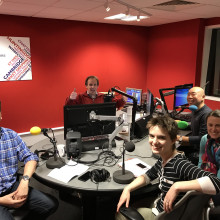
00:52 - Our panel of experts
Our panel of experts
Chris Smith got chatting to this month's guests: James Rudd, Francesca Chadha-Day, Clare Bryant, and Giles Yeo. First up, Chris asked Giles what has caught his eye recently...
Giles - There's always all kinds of pseudo-scientific BS that's out there. I mean, one of my favorite ones is this company has just launched a DNA diet test. Now so far, so not new because I think lots of people have done it, but they have now incorporated one of these watch-Fitbitsy type of thing, watch thing, which goes red or green. And so what happens is you get your DNA test, you have an app as everything does, and then you go to the supermarche, and then for example, you then scan the barcode of item X, and then you'll watch this watch thing pings red or green. Whether or not you should eat it.
Chris - They're saying then that they can tell based on your genetic profile whether that food is fit and suitable for you to eat?
Giles - That's correct.
Chris - To achieve what? Because your aims might be different from one person to the next, so how would it know?
Giles - No, no, exactly. I mean, do you know, do you have a heart problem? Do you have irritable bowel syndrome? Are you type two diabetic, all this information? Who knows? And anyway, as you stood at the beer aisle for example, is it really ever gonna flash green? When is it ever going to flash green? I love beer, but when is it ever going to flash green at the beer aisle?
Chris - Well I don't know. There's some quite good stuff in beer, isn't there? I mean, if you drink Guinness, cause we, you know, certainly some older people have been advised to drink Guinness. Isn't Guinness got certain fortifying things, which if you have a fairly meager diet in other ways can, can help to pep you up a bit?
Giles - No. So, I don't know if this is apocryphal or not. It's supposed to be quite high in iron. I don't know if this is true. You know, how much of it is available. I think that probably is true. And it's high in calories for sure.
Chris - Hmm. Yeah, that's certainly true.
Giles - But it's like eating soup.
Chris - Yeah. But is it not true, though, that more about in terms of what foods are and aren't going to agree with you and be good or bad for your health, that's more to do with the microbes that live inside you than just your genetic makeup, isn't it?
Giles - I don't know about more to it, or not. I think certainly the microbes are going to play a very, very large role. I don't know, I don't know if more is actually true. I think there are going to be genes which indicate whether or not you prefer fatty food or sugary food and whether or not you want to eat more or less. That's true, but none of that is going to be predictive based on some DNA test.
Chris - Absolutely. Giles, thanks very much. So Giles is here if you want to ask him anything about diet, about your genetics and how that predicts, what sort of things might happen to your metabolism, weight gain, weight loss and so on, now is your chance to ask Giles those questions. Sitting next to Giles is immunologist and wine expert. We always, we always have your, when we talk about stories about wine, Clare, that's Clare Bryant, but you actually, you are a professor of immunology, I mean ,that's your day job, is it not?
Clare - That is, that is my day job, Chris, it is indeed. But you do always wheel me out as the wine expert.
Chris - So, anyway, now's your chance to tell us about something that you've spotted this week.
Clare - Which of course does have something to do with wine. So yeah, the thing that perplexes me a lot and in fact it follows on quite nicely from what Giles has just discussed. So there's this Silicon Valley startup company, which says that what it can do is by taking your DNA sample, it can predict what wines you would like to drink and it will then send you a case of very expensive California wines tailored perfectly to your palate. And this company has been sustaining. It's still going after two, three years I first saw, well, it came to my attention and it is particularly perplexing because in fact there were probably only three or four genes that have been sequenced that have anything really significantly to do with taste and certainly to do with the taste of wines and given your taste in wine is very personal and is also affected by food and how you're feeding and your immune system - I have to get the immune system in there somehow - it's remarkable.
Chris - Someone did point out to me as well, cause they were studying what happens when you put food, including wine, in your mouth, and because of the microbes in your mouth, some wines actually taste different to some people at different stages of the drinking process. So as you put wine in, the evolution of the flavor is because if you have certain populations of mouth microbes, they actually metabolize on the fly some of the things in the wine and change the taste. So as it evolves you will get that hit of flavor that other people who don't have those bugs don't get.
Clare - Absolutely, particularly pronounced, actually, if you do cheese. Cheese and wine and the evolving taste of the cheese and the evolving taste of wine in your mouth. It's amazing one wine does not taste like another.
Chris - So how is this company getting away with flogging this? Cause it just seems this DNA business has just gone too far and it's now being used as this black box, which is, everyone's impressed by it. It's a bit like AI, you know, 10 years ago we were putting the letter I in front of everything. If you had I in front of something, it was amazing. Everyone's all, it's gotta be impressive then. Now it seems to be the AI or something with DNA in front of it.
Clare - Yeah, I mean it is bizarre, but I guess it's so hard to predict what wines you're going to like that maybe if you just don't have the time or are not prepared to put the time in, that you'll believe anything that anyone tells you. And if somebody tells you 'yep, your genes tell you that and we're gonna sell you the wine that matches it'.
Chris - Well, don't get taken in by anything from this program. You can believe everything you hear here. If you have any questions about anything you've heard there, or how the immune system works, we're going to talk later on about antibiotic resistance and that kind of thing. Clare's going to take those questions. Also with us, Fran Chadder-Day, who is a physicist and works on dark matter and basically how the universe works. So from really complicated things about DNA to really simple things like how the universe works.
Fran - Trivial, I assure you.
Chris - And what have you spotted that you'd like to share with us?
Fran - So, one thing that's been in the news recently is reports that scientists have discovered a new fifth force. So, the forces we know about are gravity, electromagnetism, the strong force which holds nuclei together and the weak force, which is relevant in some nuclear decays. But scientists studying nuclear decays of helium and beryllium, very rare decays, have discovered some anomalies.
Chris - This is radioactive decay you're referring to, isn't it, when the atoms fall apart spontaneously?
Fran - Yes, that's right. They have discovered some anomalies that could point the existence of a new fifth force and everyone's gone 'I'm very excited about it'. I would as always with these kinds of stories, urge caution. Often, these things are a systematic problem with the experiments. These experiments are very complicated and there's very often an explanation that isn't anything to do with new physics.
Chris - Well, one person said if this turns out to be true, that's straight away a Nobel prize.
Fran - That's true. Yes. But I don't think we should be rewriting the textbooks just yet.
Chris - So a skeptical maybe from Fran. So, anything to do with how the universe works, send your thoughts in for Fran. Also with us is James Rudd. Now, we haven't had James on for a little while, but the last time you were on here you were talking about radioactive toothpaste. You're a cardiologist, you're a heart doctor.
James - I'm a heart doctor and a heart researcher. Yes, Chris. And we have been using a scan on patients who have valvular heart problems and also people who are at risk of heart attacks, and we inject them with a compound that's very similar to toothpaste. It's called sodium fluoride and the sodium fluoride sends to hone in on the patient's arteries and heart valves. And we use that information to try to predict people who are going to have heart attacks and strokes, and also people are going to have valve disease in the future.
Chris - I think we should point out there, James, that you are one of the inventors and the pioneers of this technology.
James - Well, me and many, many other people who've worked on this around the world. Yeah, indeed.
Chris - Because it's a massive problem. We know that people with narrowed heart arteries have symptoms when they get angina, pain in the chest and when they exercise and things. But what we don't know is the people who are going to have a heart attack because all of a sudden one of those narrowings is going to cause blood to clot in the artery and your work is actually giving us a clue as to where those hotspots might be that we currently had no way of spotting before.
James - I mean, in a sense they are a bit like dark matter because the ones that tend to go pop and cause the sudden death and heart attacks are often the ones that are very, very small areas of the artery and not really causing a big narrowing, so actually very hard for us to spot using our traditional scans.
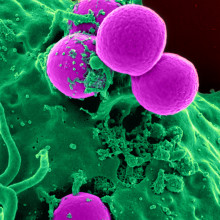
08:25 - Emotional immune systems
Emotional immune systems
Immunologist Clare Bryant answers...
Clare - Yes, it's a really interesting emerging area. So, if you look at patients that have got severe depression, for example, what you find is, if you look in blood samples from these patients, they actually have elevated levels of inflammatory mediators. And in fact, you can look at different mouse models of depression and you can see that in those animals, you get the influx of immune cells into the brain, you can see increase in inflammatory mediators, and there seems to be a gathering body of evidence to suggest that. And it kind of makes sense because stressed people will produce cortisol. Cortisol dampens the immune system. So you can see how the immune system and the CNS works in balance. And also immune cells can actually modify regions of neurons called synapses, which is where neurons talk to each other. Immune cells can actually trim little areas of this off. So, you could see how there's a complex interplay between the immune cells and the neurons and that would then affect mood and mood disorders.
Chris - And is that the basis of the observation that if you take, say an elderly person caring for another elderly person who describes that as very stressful or someone who is lonely and you find that in them, they tend to respond much less well to say a flu vaccine?
Clare - Presumably, yes. I mean, it all will kind of make a lot of sense, wouldn't it? That these kinds of interplays between efficiency of vaccination and what's happening within your brain and your mood would potentially affect how your immune system responds. But also in the elderly, we know that they are already in a state of heightened inflammation anyway, and that could also affect how a vaccine works. So I think it's, it's a very complex interplay of different systems.
Chris - And can that affect the progression of heart disease, James, and how fast arteries fur up, cause there's an inflammation part and parcel of that.
James - Very much so, Chris. Yeah, inflammation has long been recognized as probably the prime player, really, all the way along from very early vascular disease, very early hardening of the arteries, all the way through to triggering heart attacks. And hence stat in drugs. Probably half of the effect that they have is due to their anti inflammatory effect on the arteries.
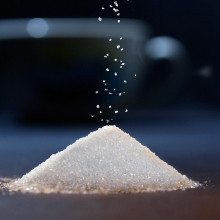
10:38 - Fat or sugar - what is worse?
Fat or sugar - what is worse?
Giles Yeo answers this one...
Giles - Look, I think the answer is obviously too much of either. I mean, for sure in the 70s people were going 'low fat, low fat, low fat', you know, 'fat is a demon'. And so low fat foods come out. But the problem is fat tastes fabulous in food. And so when you remove it, you have to add something back, and then people then piled it in was sugar, and now people think that sugar is the new cocaine.
Chris - Do they really think that, Giles, or did you just speculate?
Giles - They do. When people, you know, they show a white powder. If you look at the imagery, if you look at the imagery in certain sectors of the food industry or the food gurus, the imagery, looks as if you know, someone is about to snort something. So no, I'm not, it's not hyperbole. People do think it's the next cocaine. But I think something important to consider, sugar is our base fuel. We need it and we need fat in order to survive. And so clearly we're eating too much of both. But what's interesting is fat, per se, is quite unpalatable. We don't eat butter by itself. Sugar itself is relatively unpalatable. Everything bad for you is a mix of sugar and fat. Oh my goodness. You know, pastry, chocolate, and and I think that's probably part of it, where a lot of the foods that we actually are eating today are high in sugar and fat. In nature, naturally, the closest thing we get to that mix of sugar and fat is milk, it's breast milk. So you know, clearly as a little baby we would have really enjoyed it. But out there, you know, very, very little sugar and fat and mix together.
Chris - Do you think that's part of it then? Do you think that's why we are so fond of that combo? It's to make sure that we get adequate nutrition when we're breastfeeding?
Giles - Probably. And I think it's probably one of these things where it's a hard-wired, primitive drive to eat that specific mix of products. And if you actually literally, if go and think about it, everything, or the vast majority of things that are really delicious to eat are a mix of fat and carbs.
Chris - You started by saying in the 1970s we demonized fat. I've got two questions off the back of that, then. One is, why did we reach the conclusion fat is bad? And do you think, then, that we have, by demonizing fat and pushing everyone towards putting sugar into things instead of fat, we've actually triggered the present obesity situation we have?
Giles - That's an interesting question. I think people, some people have argued that. I think the present obesity situation is too much food in general, period. It just so happens that foods that are high in sugar is very, very easily preserved. And so, you know, a lot of the ultra processed foods that are actually out there are going to be high in sugar and probably high in fat as well, and salt actually, in order to make it taste nice after they've been, you know, put through the ringer. So, I don't think is any one thing, per se. It clearly had a driving role. The question of course, as well is, what kind of fat we're talking about? We're talking saturated fats, okay. Unsaturated fats? And so not all fats are equal. So, I think demonizing the entire load of fat, has clearly been a silly thing to do.
Chris - How did they reach that conclusion? Fat equals bad.
Giles - I think when you actually looked at it, well, clearly if you actually had too much fat and at the time when you eating fat, you're eating lard, you're eating animal-based fats, you're eating saturated fats, you know when you went, chips were actually all fried and animal-based fats. Whereas as we began to actually go through and understand, hang on a second then there are unsaturated fats, there's olive oil, olive oil is actually not so bad for you, actually it's quite good for you, and then people began to have a more nuanced view of fat. But I think in the seventies, people probably thought that, 'Oh, you know, when we're talking about fat, we're talking about butter, we're talking about lard', and that's probably it. And that, at high amounts for many people, not good for your cardiovascular system.
Chris - But that is what the Atkins diet is founded on, isn't it? A high saturated fat intake, substituting those fats as calories for carbohydrates. So has that therefore translated into slimmer people with a higher risk of heart disease, then?
Giles - Actually, the Atkins diet is more a high protein diet than it is necessarily a high fat diet.
Chris - But you can't get one without the other.
Giles - That is very true. I mean now you're not, I think there is a very dangerous line and there are certain cardiologists out there and I'm not not the one sitting in this room who argue that, you know, we can eat as much fat as possible. Okay. That, that really, it's all about fat. Eat as much fat, the fat is not going to be bad for you. And I think that's a dangerous line. I think there are people whose dietary-related, you know, lipids and cholesterol are not sensitive to diets and so they can probably eat a whole stick of butter. But for the vast majority of us, I think eating too much saturated fats is not a great idea.
Chris - James?
James - Yeah, I completely agree with Giles. I think a balanced diet is the way forward. These extremes, either extreme carbs, extreme fats, extreme protein I don't think is healthy.
Chris - Have you had patients who subscribed to Atkins-type diets in order to lose weight because they're told, 'Oh, you're overweight, that's bad for your health'. So they then substitute with one of these diets and end up paradoxically making themselves slimmer but in worse health?
James - Certainly, it works. I have had patients who have lost significant amounts of weight on this kind of diet. Their lipid profile, so the cholesterol in their blood, seems to change often in not a very good way, so the protective cholesterol seems to go down, the bad cholesterol, we call it the LDL, seems to go up. There are longterm dietary studies going on where we're studying the effects of things like the Mediterranean diet, the Atkins diet, and many, many other ones that are out there. But I don't think the studies have been going long enough to tell us whether it actually increases or decreases your risk of heart attack and stroke.
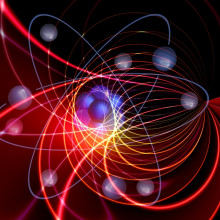
What is a Neutrino?
Fran takes this question...
Fran - Yeah, that's a good question. A neutrino is a very, very light particle. It's one of the particles of the standard model, which means we're very sure it exists. It's produced in radioactive decays, and around a hundred trillion neutrinos pass through your body every second. But because they're so weakly interacting, they just go straight through you and you don't notice them. To detect even a handful of neutrinos we have to build huge and very, very sensitive detectors; but they're actually all around us, they come from the sun, they come from nuclear reactors, they were produced in the early universe... so they're just everywhere.
Chris - So are they actually part and parcel of an atom or, are they only produced when there's a radioactive event - an atom decays, for example, and then the particle whizzes off - and if the latter, what's their ultimate fate then?
Fran - They're only produced in a radioactive decay, as you say. When they're produced by the atom they whizz off. And they don't really have an ultimate fate. They just stream through the universe forever.
Chris - Does that mean the number of them is therefore, theoretically, permanently increasing indefinitely?
Fran - Yes, but space is expanding. So more and more are being produced, but they're also being diluted by the expansion of space.
Chris - But the number of neutrinos out there is going up all the time, through radioactive decay? And they're not going to turn into anything else, there's nothing else they can do, once they're a neutrino?
Fran - They do occasionally turn into other things in a process that's like the inverse of radioactive decay. I don't quite know how those two effects balance out. My guess would be that whenever a radioactive decay happens, some decays always produce a neutrino, whereas once the neutrino is there it's very rare for it to ever interact with anything. So my guess would be the total number of neutrinos is always increasing. But I'd have to go and check that to tell you for sure.
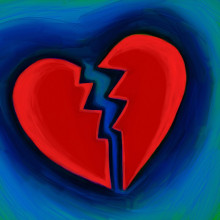
Deadly broken hearts
Cambridge cardiologist James Rudd took on this question...
James - It is possible, but it's very rare thankfully. There is a condition which is called takotsubo cardiomyopathy, but often people call it broken heart syndrome. It was recognised in Japan in the early 1990s, and the word takotsubo actually means octopus pot; it's a kind of octopus trap that was used in ancient times in Japan. And this is a condition that can be brought on by things like bereavement of a spouse or a loved one. Some trauma, being involved in a terrorist attack, has also caused this. It's extremely rare, but it does... the symptoms the patients have seem to be very similar to heart attacks. Interestingly, people have also described it after happy events in their life, surprisingly. So I've seen a patient who has won the lottery and then has developed very severe pain in the chest and come into hospital thinking they're having a heart attack.
Chris - Ah. So it's the symptoms; but if we do blood tests, which would normally mark up someone who's having a heart attack, are they negative then?
James - The blood tests are positive because there is damage to the heart. But if we, if we look at the arteries around the heart, like we normally would do - where there's a blocked artery causing a heart attack - what we find in broken heart syndrome is the arteries are completely normal, but the heart is not beating. The top part of the heart beats normally; the bottom part is blown out like this octopus trap that the Japanese doctors first described.
Chris - So what do we think is going on then?
James - Nobody knows for sure. People think it's likely to be due to a sudden surge of adrenaline as you would get in a very stressful situation, either a positive or a negative stressful situation, and also the way that the heart is innervated by the nervous system. Because the top part of the heart seems normal; it's the bottom part that is almost stunned, really, and it's just not working at all, and causes, as I say, symptoms of chest pain and breathlessness.
Chris - Wow. How do you spell that octopus trap again?
James - Takotsubo.
Chris - Wow. Thank you for teaching me something brand new. I'm going to impress everyone with that now.
James - The good news is, I should say, is it almost always gets better on its own. So you don't need to do anything apart from just to give patients some pain relief.
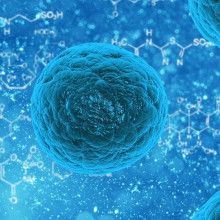
22:03 - How do antibiotics kill bacteria, but not us?
How do antibiotics kill bacteria, but not us?
Clare Bryant answers...
Clare - Yeah, well that's the holy grail of any form of chemotherapy, which is a drug that will kill what you don't want but leave your healthy cells alone. So with bacteria it's relatively easy, because what you're aiming to do is to target something that's expressed by the bacteria, so some constituent of the bacterium that's not present in humans or animals. Bacteria for example... the classic example is penicillin. Bacteria have a very thick bacterial cell wall, which is made in a very unique way by a series of enzymes. And penicillin will actually target the enzymes that are in the bacterial cell walls. And those enzymes aren't present in humans or animals, so therefore you get a selective killing of the bacterium but you leave the mammalian cells alone.
Chris - Is that why we have a problem making good drugs for viruses? Because bacteria, being cells in their own right, are really different from our own tissue and cells; they're quite easy, relatively speaking, to find differences between them and us. Whereas viruses are part and parcel of us, when they infect us they're growing in our own cells, using all our own equipment; it's like they come in and hijack the premises, isn't it, and turn our factory into a virus factory instead. And therefore much harder to find a difference.
Clare - Yes, indeed. And this is the big issue with viruses, except that there are some unique viral target proteins, which is... then we use, for example, vaccination to generate an immune response, which will target a viral unique protein. It gets even more complicated with fungi, and then even further complicated with cancer, of course.
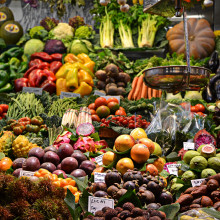
Are all calories created equal?
Giles Yeo answers this question...
Giles - Okay, so what is a calorie first? A calorie is the... it's not an SI unit, SI units are in joules, but a calorie is the amount of energy it takes to raise one litre of water one degree Celsius at sea level. So in a sense, a calorie is a unit of energy, so all calories are equal. But - and here's the but - if you actually take calories in food, we cannot extract every single calorie from every type of food that we eat. It's down to caloric availability. So three examples, which I use - if you have a hundred calories of sugar, if you ate a hundred calories of sugar, you would get a hundred calories out, pretty close to that. Whereas if you ate a hundred calories of sweetcorn and then you peeked in the loo the next day, it's clear you haven't absorbed anywhere close to a hundred calories of sweet corn. But yet if you take sweetcorn, you desiccate it, you turn it into a corn meal and then convert it into a corn tortilla, suddenly a far greater percentage of the calories are suddenly available to you. And so in that sense where a calorie comes from actually matters, even though when you've absorbed the calorie, they're all equal.
Chris - Therefore, when people talk about the glycaemic index of something, what does that actually mean and how does that translate into good diet practice?
Giles - So the glycaemic index is the speed at which the blood glucose, your blood glucose levels, go up after a specific meal. And it's based on the maximum, so the 100% is sugar because obviously it's pure glycaemic, okay, so you eat it and it goes up. So that's set at a hundred. Everything else is then based on the time after that. And so something which is going to be high in refined carbohydrates is gonna have a high glycaemic index; something which is higher in things like fibre or starches will have a lower glycaemic index. But the interesting thing is you can't just look at it in isolation, because the glycaemic index, the problem with that, is it looks at individual foods. Whereas if you actually mixed foods, say for example if you fry something very oddly and you introduce the elements of fat, fat slows down the release of sugar. So it lowers the... for potatoes, for example. A crisp will have a lower glycaemic index than a boiled potato. So I think just looking at the glycaemic index for health is not necessarily a good thing, because no one here is going to argue that a crisp is healthier for you than a boiled potato.
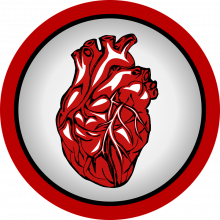
26:20 - Keeping hearts alive outside the body
Keeping hearts alive outside the body
Cardiologist James Rudd takes this question...
James - Yes, it's a very good question, Chris. And I should say that around 200 heart transplants take place in the UK every year, but unfortunately over a thousand people a year die on the waiting list because they just can't get a suitable donated heart in time. Now the current method of taking hearts out of donors is that the heart is placed into an icebox where it is stored, and then the icebox is transported to the person who needs the new heart. Now the way of doing it using the icebox means that the heart stops beating because there isn't any blood supply. So the heart itself immediately starts to deteriorate and the heart cells die. It is cooled down using ice, so this offsets the deterioration to a certain extent, but still the heart needs to be implanted into the person within about three to four hours. So that limits the geographical range that hearts can travel from recipient to donor. There's a new technology which has been around just for a couple of years already called heart in a box. And that's a method of transporting donor hearts that allows them to survive up to eight hours outside the body. And the way it works, again it's a lunchbox-sized device, but this time the heart keeps beating once it's outside of the donor's body. It actually uses a similar technique to a heart-lung machine where the donor's own blood supplies the heart muscle with oxygen and glucose, and also immunosuppressant drugs which keep it beating and keep it in the best condition before it's implanted into the patient. And that can extend the time out to around eight hours. Machines are expensive, about 150,000 pounds, so they're not used in every case. But experts believe that that will increase the number of organs available by about 50%, so many more of those people on the transplant waiting list will hopefully get something in time.
Chris - I was also talking to the surgeons who do transplants of other offal organs, things like livers for example, kidneys; and they were testing devices so that you can rest an organ and give it a circulation for a while before you transplant it. And they were finding when they did this, they could get some organs to recover to a stage where you would then - have previously rejected them - you would then instead aacept them and say, "well that's good enough to transplant." And it would appear that instead of it having had a shock of having been taken out of a donor and then have the shock of going into a new patient, by resting it in a controlled environment for a little while beforehand, it enables it to regenerate a bit.
James - Yeah. I think that's very similar to the way that this is done. So organs that, we call them marginal organs, that might have been a little bit not good enough to be transplanted can now become available to a wider pool of people.
Chris - Yeah. Of course one other aspect of this is relevant to your field of immunology, Clare, and that's actually organ rejection, isn't it? Because one of the big challenges is finding organs that are a match. So when people talk about that, saying "I'm looking for a match", what do they actually mean by that?
Clare - So effectively what you're trying to do is to make sure that the organ matches the tissue in the immune environment of the patient to whom the organ is going to be donated. And so there are various ways you can do that. There are various molecules, you can look at different tissue types, and find somebody who's got an immune system and tissue that's as close to the immune system of the recipient as you possibly can. So that's why there are organ donor registers and so forth. So it's a central part. But what you also do is you put your patients on immunosuppressive drugs, which actually dampen down the immune system. So you're giving it the maximum chance, you have a tissue type that is closely matched between the donor and the recipient, but you also suppress the immune system so it doesn't attack the organ when it goes into the body.
Chris - There must be consequences of damping down the immune system like that though. Because we have an immune system for a reason.
Clare - Yeah, yeah. There are massive consequences. So the biggest problem is, well, one of the biggest problems is trying to protect your patients then from getting infection. So whereby a cold is normally something that one can fight off quite easily, if you're a patient on immunosuppressive drugs, particularly early on after a transplant when you're on particularly high doses, then you're at serious risk and you need to avoid people who've got colds and various other relatively harmless ailments to a greater degree. Because this can cause a serious, serious problem in these patients.
Chris - Why can't we reprogram the immune system to say... because it obviously had to learn in the first place that your heart is part of you, and to regard it as friendly; why have we not been able to reprogram the immune system to say, "James has kindly given you his heart, Clare, this is your friend. Don't reject it."
Clare - Yeah. We're moving towards being able to think about these things all the time, as we understand how 'foreign' and 'self' is seen within the body, and what the molecular biology behind those processes are. And we have processes such as gene transfer, gene editing, the CRISPR-Cas9 systems. They are all ways in which we can potentially change organs and change cells within organs such that they are more familiar to the immune system of the person that they're going into. But we're a long way from that at the moment.
Chris - Fran?
Fran - So related to that, why is it that if a woman is pregnant, her body doesn't reject the baby as foreign tissue, but if the baby then grows up and donates an organ to her, that could still be rejected? What happens over that period? And could we use it to help?
Clare - Yeah, I mean there's quite a lot of changes that go on when somebody is pregnant. So they actually become semi-immunosuppressed and that helps to protect the baby. And of course a baby is not necessarily going to be a good donor for a mother because the baby has the father's DNA as well as the mother's DNA, so it depends how much of the mother's immune system and how much of the father's immune system, and the complex recombination, because the genes that are present in the father and mother in the immune system can also mix and match. So it's a complicated process.
Chris - It's also interesting that certain diseases of the immune system, autoimmune diseases, where the immune system attacks a tissue that it shouldn't do become much more common after a woman has had a baby. And people have pointed out that if you go hunting through a woman's body you can find, after she's been pregnant, examples of her baby's cells that have come out of the baby, gone round her bloodstream, and then taken up residence in certain tissues. For example the thyroid, people have done this showing if a woman has had a boy baby, there's no way she would ever have a Y-chromosome in her body. But after she's been pregnant you can find cells with Y-chromosomes in them in some of her tissues. And the suggestion is that after the baby is born and the immune system gears itself up to full strength again, then you get these autoimmune problems because all of a sudden the immune system starts to see these foreign cells sitting there in the host tissue that shouldn't be. And then you get a reaction.
Clare - Absolutely. And you've also reverted the hormonal status of the person, because things like progesterone are very, very - which is what's produced during pregnancy - is a fantastic immuno damper. And as soon as you bring oestrogen back in, which soups your immune system back up, then off you go and anything foreign is going to trigger a reaction. So yeah, it is very interesting.
Chris - The immune system's an amazing thing, isn't it? And it's one of those things we just don't have really much of an insight into really what it's really doing. We vaguely understand, at a sort of broad level, but we really don't understand the intricacies, do we yet?
Clare - One of the exciting things now is that we're really moving much, much further into understanding what the individual cells do and the plethora of cells, and there are different subtypes of sales, which makes life very complicated. But also as we look at patients of various rare diseases where they have to find mutation in different immune genes, then we're beginning to use that information to understand what the immune system does. But there is a long way to go.

What is CERN up to now?
Physicist Francesca Chadha-Day answers...
Chris - And didn't they have a weasel problem? They did, didn't they?
Fran - Yes, they did. CERN is the home of the Large Hadron Collider, which is a machine designed to smash protons and sometimes other things together very quickly so we can see what comes off. In 2012 they discovered the Higgs Boson, the particle that gives things mass. That was a very big deal. In 2016 they had a problem where a weasel got into their electrical equipment, which was quite amusing, but dealt with very quickly.
Chris - How did it get in and what did it do?
Fran - So CERN is a very, very large facility and for that reason it has to be in the countryside. So, wild animals just are a bit of a problem. So it was an external box of electrical stuff and it got in, it chewed through some wires, there was a short circuit. I don't think the weasel made it
Chris - It's quite funny that you've got something that's worth 3 billion Euros, that's running with its own power station running it, and a weasel got into the works and just brought the house down.
Fran - Yeah. They did get it up and running fairly quickly.
Chris - Have they got a weasel detector or something? How did they find out that that's what did it?
Fran - I think they probably found the body of the weasel.
Chris - Oh dear. So it didn't end well for the weasel. So what are CERN actually doing now then? You said they found the Higgs Boson and they've done confirmatory experiments to be reasonably sure, and then Peter Higgs was one of the co-winners of the Nobel prize to reflect that. What are they doing now?
Fran - So since then they've been searching for other new particles and haven't found any, but the knowledge that there aren't new particles in the range in which they've been searching is actually quite valuable, and actually rules out a lot of theories of new physics that we thought might be true.
Chris - So sometimes a negative is as valuable as a positive finding?
Fran - Yeah, it's obviously less exciting but it does mean that physicists are starting to rethink things like what we think dark matter could be, what new particles could be out there. I'd also like to mention that CERN isn't only the home of the Large Hadron Collider. That's perhaps the most famous experiment at CERN, but there's actually a lot of smaller experiments there. For example, a lot of experiments looking at nuclear physics and nuclear decays, other experiments searching for dark matter. So there's a lot going on.

37:45 - Printer ink - the most expensive liquid?
Printer ink - the most expensive liquid?
Clare Bryant, Giles Yeo, Fran Chadha Day, Cambridge University; James Rudd, Addenbrookes' Hospital
Our expert panel - Giles Yeo, Clare Bryant, James Rudd and Fran Chadha-Day - take on some fiendish quiz questions...
Chris - So James and Fran, you are going to be team one, and Clare and Giles, you are going to be team two. Round one is called scientific “oops”. So team one, that's James and Fran.
In the 1950's Noah McVicker and his brother, they worked at a soap company where they invented a clay based product that was for cleaning wallpaper to get the soot stains from cigarettes and coal-fired powers off of the walls, but the invention of wipe clean wallpaper unfortunately threatened to put pay to their invention until a nursery school teacher pointed out its potential and they turned it into. What do you think the answer is?
Fran - Well maybe it's something like Play-Doh?
James - I was going to say something like a whiteboard cleaner? Play-Doh is a good idea as well though. Nursery school 1950's. Yeah probably right, I reckon Play-Doh.
Chris - It is, very well done. It was indeed Play-Doh. Unfortunately, vinyl wallpaper threatened their industry, so they had to think outside the box and they took the soap out, put some colour in. The secret to the recipe remains intact. No one knows how they make it or how they give it that lovely smell, because I guarantee if I say Play-Doh, everyone can smell it. You can all smell it.
Fran - Definitely
Chris - You're all thinking of it.
James - Evocative.
Chris - Okay, well done. Well done to James and Fran. One point. Okay, Claire and Giles, it's your turn. Which of these inventions was not an accident? Laser pointers, microwave ovens or safety glass? What do you think?
Clare - Oh, what do you think?
Giles - I think it's going to be something like the safety glass. I bet you that was, that was done entirely, was not by accident.
Chris - Which one of these inventions was not an accident?
Clare - Yeah, yeah I kind of think...
Giles - I would go with safety glass.
Clare - Yeah. Safety glass. We are going with safety glass.
Chris - No, actually it's the laser pointer.
Clare - Interesting.
Chris - Microwaves turned up when, you might know the fairly famous story actually, the scientists noticed, he was working on radar and he had a microwave generator, a magnetron, on the desk in front of him. He had a chocolate bar in his pocket, and when he went to eat his chocolate bar it turned all gooey and realised that there was something coming out of this magnetron, which he was using for his radar experiments, which was very well absorbed.
Giles - That was microwaving him.
Chris - That was microwaving him but more importantly, microwaving and melting the chocolate bar. So the microwave was directly informed accidentally by that experiment. The other one was safety glass, which you chose and actually safety glass was a scientific accident. Someone dropped a whole beaker that they were working on, which was full of cellulose nitrate. When the beaker hit the ground, it didn't smash. It cracked a bit, but it remained intact. And that's because the inside of the glass had got coated with whatever the cellulose nitrate was doing and then they realised the concept of making safety glasses, which could absorb impacts and not break. The laser pointer wasn't the accident. Right, so that's nul point for you there i'm afraid so far. Round two. Now this is called 'Pound for Pound', this round. Okay, so back to James and Fran. Pound for pound, printer ink is the most expensive liquid in the world. What do you think? True or false?
Fran - What about, like, molten gold or something though?
James - Does it have to be liquid at room temperature?
Chris - Oh, it's not a trick question in that respect. No, it's a liquid.
Fran - Or something like liquid helium?
James - Yeah. I have bought some printer ink recently and it is frighteningly expensive.
Chris - Set you back a bit?
Fran - Yeah. I mean maybe there's something in the pound for pound. Yeah, my instinct is that it's false, but I'm not 100% sure. Like, maybe there's just not much printer ink in the thing that you buy, so it's ends up being. What do you think?
James - It's only a few mills I think, per cartridge. So i'd say yes. It's such a ridiculous question, it must be true.
Fran - Okay, let's just say true.
Chris - You know what? You're not going to get this. Yes, and Giles is shaking. He's going, yes, yes, in with a chance! But the answer is actually the most expensive liquid is scorpion venom. The death stalker scorpion. The death stalker scorpion is the most dangerous scorpion on the planet. It's venom is also the most expensive liquid on the Earth. It's 6 million pounds per litre. 100 quid will get you a droplet smaller than the grain of sugar.
James - Wow.
Fran - Why do people want to buy it?
Chris - Ah well, you see a lot of these things, Claire would probably tell you, because a lot of these things are neuro-active, because they're very fast acting, they very, very precisely target very specific elements of the nervous system. So, scientists are really interested in them as potential leads for drugs and other therapeutics, and also ways to unpick how the nervous system works. So they're actually very valuable commodities, also other venoms from snakes and so on as well are in demand.
Clare - And of course you need to develop anti-venoms to protect you if you get bitten by one of these things.
Chris - True. Printer ink, since James, you said you're a bit out of pocket recently. You felt the sting of that. Since we're talking about the scorpions. Printer ink, a competitive 3000 pounds a litre, so still exorbitantly expensive.
James - Wow, I am in the wrong business I think.
Chris - Right, so we are level pegging now, almost. Okay. So if you get this right, you can equalise. You ready Giles and Clare? True or false, anti-matter is the most expensive substance on Earth to make?
Clare - What do you think Giles? I've got no idea.
Giles - I've got no idea, can we even make anti-matter? Isn't that an Avengers story line in terms of that?
Clare - The physicist is not helping here, you know, she's just not really supporting is she?
Chris - Do you notice how we divided the teams quite carefully apportioned to the questions?
Giles - Okay. Assuming they can make anti-matter, you probably only get some nano-particle. So I would say let's go with true.
Clare - It's got to be worth a shot.
Chris - You're going to go true.
Giles - Yes.
Chris - All right. You are going true and true is...
Giles - So you can make anti-matter!
Chris - Oh yes. If you go to, well Fran you can probably tell someone, if you go to to Addenbrooke's hospital and have a pet scan, a positron emission tomography scan, you actually are using the effects of anti-matter in order to scan someone. That's correct, would you concur?
Fran - Yeah, absolutely.
Chris - Yup. According to various sources, because it's so difficult to make, the price tag is a hefty 18 billion pounds per gram, but yep, We can make anti-matter. Level pegging, one-all, back to Fran and James. Round three, a question of numbers. Okay, here we go. This will test whether you were paying attention in the head and neck lectures when you were at medical school. James, how many teeth form a complete set of milk teeth in a child? Is it 20, 28 or 30? What do you think Fran and James?
Fran - I just do not know. 20 feels too low - I feel like I remember having more than 20 teeth.
Chris - You have now.
James - Yeah, I think it is 20.
Fran - OK, right, you should know, so we'll go with your answer.
James - Medical school was a long time ago.
Chris - You are right.
Chris - 20 is the number of milk teeth. It did seem surprising, so it was five in each quadrant - so five on the right upper five on the right lower and vice versa. Adults have, do you know how many adults have?
James - 32?
Chris - Yep, adults have 32, assuming the wisdom teeth come through. So your eights are your wisdom teeth. So 32 teeth in total in an adult. So in the lead so far, let's see if you can equalise, over to Giles and Clare. You have got to stay in this just to stay in the game. What's the chance of having twins in a pregnancy? Any twins. Okay, either identical or non-identical and this is a natural pregnancy, It's not assisted conception. Is it one in 75, one in 150, or one in 300?
Clare - Wow.
Giles - This will be have to be a guess, for some reason I remember the number one in 150, but it could be because I was imagining things.
Clare - Well, it's relatively rare isn't it?
Giles - It is relatively rare.
Clare - Yeah. So one in 150 or one in 300?
Giles - Oh goodness.
Clare - You've actually remembered a number, so maybe we should just go with that.
Giles - And if we lose?
Clare - I'll let you off, Giles. It's all right. It's not the end of the world if we lose this quiz.
Chris - So what you choosing?
Giles - One in 150.
Chris - I'm really sorry. It's actually one in 75. It's 1.33% and it's quite interesting. You can remember this because twins, non-identical twins, one in 75; triplets, one in 75 squared times; and identical twins, much rarer still, 0.3% of pregnancies. So you didn't get the point. So I think this week's winners, therefore are James and Fran. Give them a round of applause. You win a prize beyond price. That's this week's Naked Scientists big brain of the week award. So very well done to you. They look a bit miserable that you beat them.
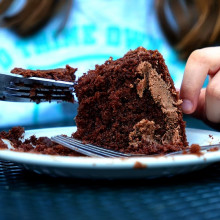
46:08 - Why do some of us stress eat?
Why do some of us stress eat?
Giles Yeo took on this question...
Chris- Now, Giles, are you a stressy eater? Do you tend to pack in the calories when you get worried about something or, or do you go the other way?
Giles- I do, a bowl of noodles. I don't want to be backing a stereotype here but yes a bowl of noodles for me.
Chris- Because this is what Amalia says - "Why do some people stress eat?" So why do they? Why do people do that? Because I'm one of them as well. You know, it's a diversion. I'm going to go and get a bowl of noodles or get a bowl of pasta and start to chomping it down, when actually it'd be much better to just get on with the thing I'm having avoidance behaviour and not doing. Why do we eat?
Giles- In short, I don't think we actually fully know. I mean, and this is one of the mysteries, right? Because leaving aside tiger stress, which is obviously everyone responds to tiger stress in the same way. We kind of run like hell, otherwise we'd be dead. But, work stress, everyday stress - we behave in diametrically opposite ways where some people don't eat and some people eat and it's the same hormone, it's cortisol and yet we respond to it completely and absolutely differently.
Chris- So that's the stress hormone cortisol. You make that when you're worried about things.
Giles- Exactly, exactly. And it comes up. There are other things that happen as well, but that primarily is it, and we respond in completely different ways. While we don't know for sure, I think being stressed is very unpleasant as we all know and we want to remove that unpleasantness. And so I just think that for some people, including me and you, the eating, you know, eating feels nice and that is a strategy to actually make us feel nice.
Chris- James?
James- Does adrenaline play any kind of role at all? Cause you think of adrenaline as fight and fright. You wouldn't necessarily sit down for a nice meal if you're being chased by a tiger. But are we talking about chronic stress raising your cortisol or how does that work?
Giles - Yeah, I'm thinking about chronic stress raising cortisol because I think the flight or fight, you got a big surge of adrenaline and what happens there is you lose all appetite because you're running and sugar just floods into your entire system.
Clare - Okay. But some of us are completely the reverse and do not eat at all when we're stressed. So, what do you reckon the biology behind that is?
Giles - I don't think we actually know for sure, but I just get the feeling that it's going to be down to your strategy for feeling, for removing the unpleasantness of being stressed. I mean, for some people it's bungee jumping. For other people it might be alcohol, maybe it's wine, you know, but I think that's probably what it is, what is your strategy for actually feeling less unpleasant? For me it happens to be a bowl of noodles. And I think that's true for a lot of people in the world of food.
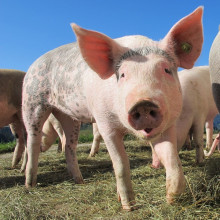
Why give humans pig hearts?
Cardiologist James Rudd answers...
James - Well, it's really all down to the fact that pig hearts are very similar to the size of human hearts. And let's talk about heart valves for a little bit. There are four heart valves in everybody's heart. And their job is to make sure that the blood flows the right way through the heart. And the valves can become diseased and damaged and they can either be too narrowed down so the blood doesn't flow properly, or they can become leaky. So the blood flows back where it shouldn't be. And so what happens is we can use pig heart valves which are specially treated. It takes about four weeks to actually prepare a pig heart valve to go into a patient.
Chris- So we would actually take the native valve from the pig heart?
James-Indeed, native valve comes out of the pig heart. It's treated with glutaraldehyde which completely sterilizes the valve, removes some of the immunological triggers that might cause people to reject it, and it's then placed in a kind of a strut which is suitable for sewing into a patient.
Chris- And do they substitute like for like, so the valve that you were talking about, the aortic valve earlier that you're interested in with that furring up and becoming narrowed in patients and you can spot that with your radioactive toothpaste, would it be a pig aortic valve in place of a human valve? Would it be a pig mitral valve in place of a human mitral valve? Would you go anatomically like for like?
James- Yes, you do indeed. And as I say, it really boils down to the fact that pigs and humans have roughly the same size heart.
Giles- Where are we with actually genetically modifying pigs or the heart so that we actually remove the immunological problems?
James- So in humans we're nowhere near, but there have been some experiments done where pigs have been modified and then their hearts have been transplanted to other species, which I think chimpanzees and the chimpanzees have stayed alive for about a year. So I think we're on the road to that. There are clearly perhaps ethical concerns that we need to think about before we take that last jump of xenotransplantation. But pig valves have certainly served as well for the last 40 years.
Chris- I spoke to Professor George Church from Harvard, who's a pioneer of a lot of this genomic technology earlier this year. And one of the things that he did was to work out where all of these viruses that loiter in the genome of all animals actually, but where they all are in pigs. Because one worry is when you take a heart from a pig and put it into a person, because they'd be immunosuppressed as we were discussing earlier, if any of these viruses reawaken, they would then be growing in the face of a, of a new body without any kind of immune response to tackle them and that could have all kinds of consequences. So he's gone through and found where in the genome these things are lurking and they've removed them. And this is obviously a step towards making these things safer. But as you say, we're not quite there yet with the whole question of how to stop the immune system still regarding this as pig, not human.
James- Yeah indeed. And with the heart valves, as I say, we actually blast the valve tissue itself with very strong detergent under high pressure and high temperature to kill any kind of immune signal.
Chris- Does it regrow new cells? Human cells of the recipient over that tissue then over time, so it's like road resurfacing, but then you grow a layer of your own cells. So over time you don't see pig tissue, you see human tissue.
James- Exactly. Yeah. It takes about three or four months to do that completely. So patients need to be on anticoagulant drugs for the first few months, but afterwards they can stop that. Once the valve has been endothelialised, we call it.
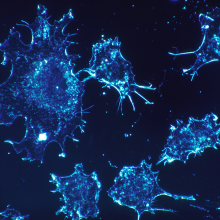
52:42 - Does cancer get past our immune systems?
Does cancer get past our immune systems?
Immunologist Clare Bryant took on this one. First of all, Chris asked, does cancer evade the immune system?
Clare- Well, most of the time, no, actually, because your cells are growing and proliferating all the time. What happens when a cell proliferates is it can have a mutation, tends to be a small number of cells in the immune system will whip them out. So what actually happens, um, when you get cancer, that is a problem, is that your cells, that are proliferating and that are mutated, they really outgrow the rate at which the immune system can take them out. The other thing that cancer cells do is they can express, under normal circumstances cells will express, "eat me" signals, and then T-cells or macrophages will come along and chew them up. Sometimes cancer cells can actually switch off the "eat me" signal and at that point the cell becomes invisible to the immune system and the immune cells just pass it by.
Chris - And is therefore, when you get a cancer, is that effectively a failure of the immune response then? It's escaped and it's managed to form a tumour?
Clare- That is exactly one of the mechanisms by which it happens. And of course there are now a whole host of immune therapies which are working super efficiently to actually really get rid completely of these cancers. So it's a very exciting area and that the data coming through on these immune therapies is really, really interesting and exciting.
Chris- The rationale being if the immune system can get rid of cancer in the first place, all we have to do is reprogramme it to do that - I say all we've got to do, but basically - redeploy the immune system and overcome whatever's held it back. To get rid of the cancer.
Clare- That's exactly the theory and it does seem to be working really well.

54:09 - How fast is the universe expanding?
How fast is the universe expanding?
Fran Chadha-Day took on this one, clarifying firstly how we know if the universe is expanding, and how we can measure it...
Fran- When we look at distant galaxies, we see that they're all moving away from us and the further away the galaxy is, the faster it's moving away from us. And we can imagine what's going on here by thinking about a balloon that I've put lots of dots on. As this is radio, you're going to have to do some visualization, but a balloon with a lot of dots on and I'm blowing it up and all of the dots get further and further away from each other, as I do that because the balloon is expanding. And if I imagine I'm sitting on one dot, the further away the dots are, the faster it looks like they're moving away from me. So that's what's going on. And one measure of how fast the universe is expanding, is how much faster the further away galaxies are moving than the closer-to-me galaxies. This is called the Hubble constant and its value is about 70 kilometers per second per megaparsec. So a megaparsec is about a million light years. So that means that something a million light years away from the earth is moving away from us at about 70 kilometers per second. Something a hundred million light years away from the earth is moving away from us at about 7,000 kilometers per second. So that is the best measure of how fast the universe is expanding. And it's a very important parameter in cosmology.
Chris - So why should something more distant be moving away from us more rapidly?
Fran - So is because all of the space between us and the galaxy is kind of increasing in size. So the more space there is, the more increasing size there is.
Chris - And hence the further you look or the furthest away you look, the greater the increment. But it hasn't always been the same number has it? Because if we look at the way that the universe is now, the only way we can explain the universe we have is if when it was very, very young, very, very small, it grew faster than a teenager and expanded very, very quickly. And then it slowed down a bit and now it appears to be speeding up again. So how do we explain that?
Fran- Yeah. So you're talking about initially there's a period of inflation and we need inflation to explain a lot of observations about the universe, notably why it's so homogenous. And no one really knows what drove inflation. It's one of the mysteries in physics, but we think there was probably some particle as yet undiscovered that drove this inflation. Now, it seems like the rate of expansion is accelerating again. Not to the same extent as it was during inflation, but a bit. And we think this is due to something called dark energy, which would be either kind of a constant in Einstein's equations, or perhaps a new particle or field that permeates the universe that is driving this accelerated expansion. As you can tell from the way I'm talking about it, we don't even fully understand what questions we should be asking.
Chris- Isn't the weird thing about this though, that um, space seems to make dark energy when it exists and the more space you make, the more dark energy you make. So it seems to be almost like it's coming from nowhere.
Fran- That's right. So with a normal substance like matter, as space expands, matter gets less dense. You know, if I've got stuff in a box and I increase the size of a box, it gets more dilute. But with dark energy, that is not the case. The density remains the same, so it just grows and grows as space grows.
Related Content
- Previous Who believes experts anymore?
- Next Kidney Transplants










Comments
Add a comment